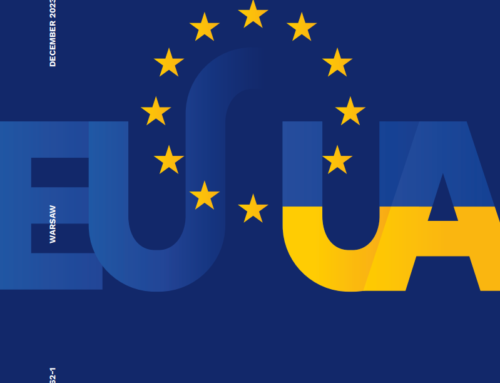The first restrictions on commodities from Russia will cost it around USD 7.5 billion per year
Opublikowano: 10/03/2022
On March 8, the US and Britain introduced a ban on purchasing oil from Russia. This will reduce Russia’s annual budget by USD 5.1 billion. The European Commission’s plans, announced the same day, to reduce deliveries of Russian gas by two-thirds by the end of this year will cost Russia an additional USD 2.4 billion, the Polish Economic Institute Estimates. This is an important first step, but halting Russian oil deliveries to the EU would be a much bigger blow for Moscow. The impact on the Russian budget would be seven times higher than the international measures announced on Tuesday.
“The US and UK embargo on oil imports and the European Commission’s plan to reduce EU gas imports from Russia will cost the Russian Federation’s budget around USD 7.5 billion in 2022 – the equivalent of around 5% of the value of all Russian exports of these commodities. This is the first campaign on such a scale targeting the critical sector of the country that invaded Ukraine. The next step – with a much larger impact – should be an embargo on oil imports to the EU from Russia, which Poland is calling for, among others. This would reduce the Russian budget by around USD 51 billion. Both now and in recent years, these funds have been one of the key sources of financing for the country’s military expansion. As an analysis by the Polish Economic Institute’s experts shows, by skilfully diversifying its oil supplies, the EU would be able to stop buying oil from Russia completely,” said Piotr Arak, director of the Polish Economic Institute.
Britain bans oil imports from Russia
On March 8, British Prime Minister Boris Johnson announced a ban on imports of Russian oil in connection with Russia’s invasion of Ukraine. The ban is expected to remain in force for several months to allow the global market to adjust and stop people from panic buying petrol. Russian oil accounts for just 9% of oil imports and accounts for a negligible part of the British energy mix. However, this step will deprive Russia of around USD 1.4 billion in revenue per year.
The US stops importing Russian commodities
The same day, US President Joe Biden announced a ban on imports of Russian commodities. Unlike the EU, the US does not import Russian gas, and coal is imported in very small quantities. In 2021, Russia exported USD 3.7 billion worth of oil to the US. Petroleum refining products accounts imported to US from Russia accounts for another USD 5 billion.
“The US embargo’s impact on Russia’s revenue will be almost 14 times smaller than that of a potential EU embargo on oil alone. Despite the relatively small impact on the American and Russian economies, we expect the ban announced by President Biden to result in a further increase in commodity prices in global markets,” said Maciej Miniszewski, an analyst on the climate and energy team at the Polish Economic Institute.
The EU will reduce gas imports from Russia
On March 8, the European Commission outlined a plan to make Europe independent of Russian fossil fuels. It is based on two pillars: (1) diversify gas supplies, by importing more LNG, biomethane, and importing and producing hydrogen, and (2) reducing the use of fossil fuels, by increasing energy efficiency and the share of RES. Gas imports from Russia are set to be reduced by two-thirds this year. In addition, in April, the Commission will present a legislative proposal, according to which underground gas storage facilities throughout the EU would be at least 90% full by 1 October each year.
“The changes are spread out over time because the EU economy is partially dependent on Russian commodities. Around 40% of imported gas, 25% of oil and 45% of coal come from Russia. The Russia’s revenue from selling oil and gas to the EU makes up around 20% of its budget, which means that a potential embargo would have a major impact on the Russian economy. However, this requires that alternative commodity supply chains be built. The plan currently presented by the European Commission could reduce Russia’s revenue by around USD 2.4 billion,” said Magdalena Maj, head of the climate and energy team at the Polish Economic Institute.
***
The Polish Economic Institute is a public economic think tank dating back to 1928. Its research primarily spans macroeconomics, energy and climate, foreign trade, economic foresight, the digital economy and behavioural economics. The Institute provides reports, analyses and recommendations for key areas of the economy and social life in Poland, taking into account the international situation.
Media contact:
Ewa Balicka-Sawiak
Press Spokesperson
T: 48 727 427 918
E: ewa.balicka@pie.net.pl
Kategoria: Analysis / Press releases / Russia's invasion of Ukraine





